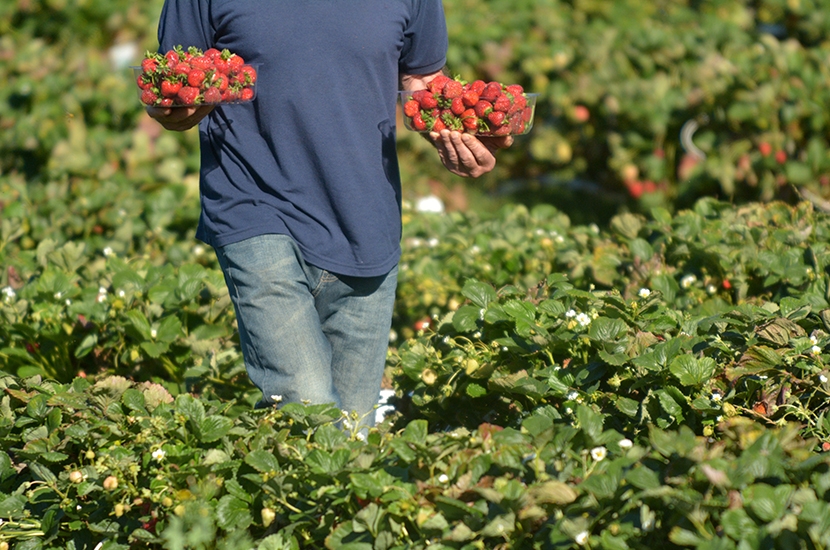We’re all slowly becoming aware that there’s a new migrant crisis. Last week Jon Donnison of the BBC, cruising the English Channel looking for asylum-seekers heading to the UK, found four young men, paddling by hand their tiny rubber dinghy. They’d come from Sudan via France, and for the last leg of their journey they’d dodged the oil tankers and container ships ploughing the world’s busiest shipping lane; only one of the young men even wore a life jacket. These were the latest of more than 9,000 people who have risked their lives to arrive by sea this year.
The other story of the summer is the shortage of labour. Desperate farmers are being forced to leave vegetables rotting in fields for want of pickers and packers. Haulage companies report a shortage of lorry drivers; restaurants, just reopened post-Covid, are closing again for lack of staff. So why can’t we put two and two together? If we urgently need pickers and sorters, waiters and chefs; if agriculture and hospitality depend on labour they can’t now find, why not let asylum-seekers do those jobs?
This is not as odd an idea as it sounds. I’ve met a lot of illegal immigrants over the past eight years, working with a therapeutic advocacy project for Syrian refugees, the Trojan Women Project, and I can promise you that these are impressive and hard-working people. Without exception, in my experience, anyone who can walk for days, negotiate with people-traffickers, survive the journey across the Aegean in an overloaded rubber boat, dodge the Turkish and Greek coastguards, hitchhike through Europe and then go another 500 miles and smuggle themselves into the UK by lorry or boat is exceptional. You’d want them on your team. We call them the ‘alpha migrants’. Yet they are forbidden to work until they get their ‘leave to remain’ and refugee status. I find this bewildering — and so do they.

‘It’s no brainer asking asylum seekers to do those jobs,’ said Rafiq, 33, who came to Britain in 2015 from Syria by boat and lorry. The journey cost him $15,000 which he had saved by working as an interpreter in Iraq. ‘My 11 months of waiting by the postbox in my hostel for the letter from the Home Office was the most miserable time of my life.’
Arwa, a 35-year-old actress, agrees. ‘I just volunteered for everything, I was so bored and lonely.’ Arwa was quite famous in Syria before the war. Then Isis invaded her home town, Yarmouk, and she set off to escape, walking from Syria through Turkey into Greece with the help of smugglers whom she had to pay $5,000. From Corfu she flew here on a US passport she’d bought for €550.
Many who are sympathetic to migrants nonetheless think it best if they stay in or near their home country; the economist Paul Collier has made this case in this magazine. Western economies should subsidise camps and factories in Jordan or Turkey for Syrian refugees, so the argument goes, to deter desperate people from paying smugglers for expensive and dangerous journeys. These ‘proximate havens’ also ensure that countries such as Syria or Lebanon aren’t drained of their brightest and best workers.
If we urgently need pickers and sorters, waiters and chefs, why don’t we let asylum-seekers do those jobs?
Yes, proximate havens are effective for some. Many refugees are happy to stay in countries where they know the language; where, when war finally ends, they are a bus ride from home. But those who arrive across the Channel, the migrants I’ve met, don’t want to work in factories, particularly not in countries where there is no hope of citizenship or rights; where it’s impossible for them to earn enough to put their children through university — the classic route out of poverty.
Take Leila, for example. Her husband was a doctor in their native Syria. When the war started the family fled to Turkey, but the only job he could get was in a razor factory. After a year, in 2015, they took a boat to Lesbos and hiked to Germany. Leila’s only luggage was her handbag and her three-month-old baby. In Germany her husband requalified and is now a doctor near Leipzig. Should he really have stayed in the razor factory?
Most of the alpha migrants we’ve met are middle-class; either young men like Rafiq fleeing war or conscription, or families like Leila’s, investing their dwindling resources into a future for their children. The Sudanese and Iranians are fleeing persecution and their own chaotic economies. But if you give them a chance, they’ll study, requalify and work. One young Syrian I know, Ahmed, paid $2,000 to come here by boat, lorry and on foot in 2016. He would love to return to his parents and his life in Damascus, but he’d be forced to fight. He is now reading computer science at Strathclyde and working for a gaming company.
We’re never going to be able to stop these resourceful people getting into boats to flee war zones. And they’re not going to stay in France, where most say they have been badly harassed by police. They come to the UK because, says Ahmed, it is less racist. That is the experience of the migrants who’ve already arrived here. And I believe we should take advantage of these bright, brave people. We don’t have to worry about being overwhelmed. Callous though it sounds, the current process, whereby people cross in boats, restricts the numbers because it’s dangerous and expensive.
There have been jobs for decades that no Britons want to do and — because our welfare state provides enough to survive — don’t have to. We have traditionally filled that gap with workers from abroad, once from the Commonwealth and more recently from eastern Europe. Why not employ the people landing on our shores?
We could make it part of the asylum process: working could speed up their claims. It would have to be organised. We don’t want a Roman-style slave market on the docks, and of course fruit-picking, waitering and lorry-driving are not why alpha migrants are here. But it’s a job and it’s a start. Migrants have often done manual jobs in the hope their children will become doctors. Priti Patel’s parents were refugees from Uganda. They ran a newsagent. And look where it’s got her.






Comments